- Home
- Charlie Higson
Double or Die Page 5
Double or Die Read online
Page 5
‘Trinity,’ he said.
‘What?’ said Pritpal.
‘It’s the answer to the clue,’ said James. ‘ “Three-part sporting achievement’s smothered in it” – trinity.’
5
Gordius
The following morning, after early school and breakfast, James was wandering along Keate’s Lane with a noisy mob of boys on their way to chapel, when he saw Pritpal nosing his way through the crowd towards him.
‘James,’ he called out, waving a piece of paper. ‘I’ve been looking for you all morning.’
‘What’s the matter?’ said James.
‘I think I have worked out the significance of the Gordian knot,’ Pritpal explained.
‘I knew you’d figure it out in the end,’ said James. ‘You’re much cleverer at this than I am.’
‘Not at all,’ said Pritpal. ‘I haven’t done anything more clever than open this letter.’
‘Who’s it from?’ asked James. ‘Not from your Mister Fairburn, surely?’
‘No, no,’ said Pritpal, ‘it is from a friend of his, reminding me that he is coming to Eton this evening to address the Crossword Society.’
They arrived at the chapel and began to file inside. There were two chapels at Eton. Henry VI’s original chapel, known as College Chapel, and a newer one, Lower Chapel, which had been built at the end of the nineteenth century when the school had got so large that not all the boys could fit into College Chapel.
As younger boys, James and Pritpal used Lower Chapel, a simple stone building decorated with tapestries commemorating the Great War of 1914–18. They found an empty pew near the back and sat down.
‘Mister Fairburn once told us that he had studied mathematics at Cambridge,’ said Pritpal, ‘and that a great friend of his from those days was now a professor there, and a fellow crossword compiler.’
‘And that’s the man who sent the letter?’ said James.
‘Yes,’ said Pritpal. ‘It all fell into place this morning when I looked at today’s crossword in The Times.’
‘Go on,’ said James.
A hush fell over the chapel as the Lower Master approached the pulpit and Pritpal slipped a torn piece of The Times out of his pocket.
‘Look at the name above the puzzle,’ he whispered.
James looked. It was the crossword page, and the crossword had been set by someone called Gordius.
The two boys couldn’t talk any more and James had to wait impatiently for the service to end before he could carry on their conversation.
Twenty minutes later, as everyone shuffled back out again, Pritpal was at last able to explain about the name.
‘It is a tradition that the men who set crosswords give themselves an alias,’ he said.
‘Like a code name?’ said James.
‘Exactly,’ said Pritpal. ‘Just as if they were spies. If you had looked yesterday you would have seen that Mister Fairburn signs himself Deadlock.’
‘And today’s puzzle was set by someone calling themselves Gordius?’ said James, handing the newspaper page back to Pritpal.
‘Gordius was the Persian emperor who tied the famous knot,’ said Pritpal. ‘The Gordian knot. Very appropriate for someone who writes crosswords, don’t you think?’
‘Don’t tell me,’ said James. ‘Fairburn’s friend is Gordius.’
‘Yes. I don’t know his real name,’ said Pritpal. ‘The letter was just signed Gordius.’
‘And he’s coming here to Eton tonight?’
‘Yes,’ said Pritpal. ‘Although I have absolutely no memory of Fairburn ever telling us about it. That doesn’t mean anything, however, as he was always very absent-minded.’
‘It can’t be a coincidence,’ said James.
‘I know,’ said Pritpal. ‘It must be part of the game.’
‘If it is a game,’ said James.
‘What do you mean?’
‘I don’t know, Prit,’ said James. ‘I’ve got a funny feeling about all this. It’s all so odd and complicated. Maybe this is something more serious.’
Pritpal laughed. ‘It is just a puzzle,’ he said. ‘That is all.’
‘Maybe,’ said James. ‘But I’m going to come along tonight to your meeting and see this Gordius chap for myself, just to make sure.’
The Crossword Society met every Tuesday afternoon in a small backroom at Spottiswoode’s bookhop on the High Street. The boys sat around on an assortment of mismatched chairs among shelves collapsing under the weight of dusty, forgotten books. A bare bulb hung from the ceiling and very little light made it through the small, grimy window. James found the room cold, cramped, dingy and uncomfortable, but the other boys were obviously so wrapped up in the world of crosswords that they didn’t seem to notice.
James got there early to make sure he was settled in by the time their special guest arrived, but he needn’t have worried because Gordius was late.
When he eventually turned up he made a big show of being polite and chatty with the boys.
‘I know all about boys,’ he said, flopping down into the largest chair in the room. ‘After all, I used to be one.’
He looked around and the boys smiled politely back at him.
‘I’m sorry,’ he said. ‘You’ve probably heard that joke a hundred times. And it was never much of a joke in the first place.’
He laughed and rubbed his eyes with nicotine-stained fingers. James took the opportunity to study him. He had a narrow moustache and longish hair swept back from his forehead. He was wearing an expensive, well-cut dark suit but it was crumpled. He had the look of a man who hadn’t been to bed for a couple of days and hadn’t changed his clothes in that time.
He muttered something to himself.
James could smell alcohol on his breath. His eyes drooped sleepily and seemed unfocused and watery, the skin around them puffy. He had obviously once been quite handsome, but he was losing his looks. His skin was pale and greyish, as if he rarely went out into the sunlight. One side of his face seemed to sag – the left side – and James saw that his left hand had a slight tremor, so that it constantly shook. He had an ivory-topped cane with him, and he had limped slightly when he came in.
‘Now then?’ he said, looking round at the boys. ‘You all know that I am Gordius. Let’s find out who you all are.’ He turned to Pritpal. ‘You must be Pritpal Nandra, who Alex has told me so much about.’
‘That’s right,’ said Pritpal.
‘And what about you others?’ said Gordius, looking around. ‘No, don’t tell me. Let me guess.’ His gaze settled on a tall, impossibly thin boy with a very long neck and a drooping nose that made him look something like a flamingo. He was wearing a twelve-foot-long scarf, considered fashionable among some of the boys. It was wrapped once around his neck and the two ends were tied behind his back.
‘You look like a Felix Dunkeswell to me,’ said Gordius.
‘Spot on,’ said the boy. ‘Right first time.’
He guessed a couple more of the boys, getting one right and one wrong, and then turned to James, who was sitting out of the way in a dark corner.
‘And you…?’ he said, peering blearily into the gloom. ‘Skulking back there in the shadows. I would hazard a guess at Luc Oliver. Am I right?’
‘That’s very good,’ said James. ‘I wish I knew your secret.’
Pritpal started to say something, but James warned him with a quick glance to keep quiet. The other boys played along, enjoying the game and fooling this adult.
‘It’s simple detective work,’ said Gordius. ‘Based on observation. I understand people. I can read them like books. I can tell everything there is to know about someone in a single glance.’ He clicked his fingers. ‘Like that!’
‘That’s a very useful trick,’ said James. ‘What gave it away with me?’
‘You look different,’ said Gordius. ‘Not like the other boys, and with a name like Luc Oliver, I’m guessing you’ve some foreign blood in you.’
‘Scottish father,
Swiss mother,’ said James, without needing to lie.
‘Yes, well,’ said Gordius and he seemed to lose interest. He gazed around the room and stroked his moustache, a distant look on his face. Then he came back to his senses, blinked and slapped his hands down suddenly on the arms of his chair. ‘Now then,’ he barked, ‘it was Alexis who invited me along to meet you lot tonight. I must say I am surprised to find that he’s not actually here.’
‘Do you not know, sir?’ said Pritpal.
‘Know what?’
‘He has left the school,’ said Pritpal. ‘I thought he might have written to let you know.’
‘No,’ said Gordius. ‘I’ve heard nothing from him these last few weeks. He used to write to me regularly and tell me all about you boys and what you got up to in these meetings of yours.’
‘Then you’ll know we like to come up with clues and test each other,’ said Pritpal. ‘I wonder do you have a favourite clue, sir, or a real brain teaser to try us on?’
Gordius stared at Pritpal as if he was seeing him for the first time. He held the stare for ages, saying nothing. ‘What did you say?’ he asked at last.
‘A clue, sir? Do you have a favourite clue?’
Gordius waved a hand distractedly. ‘I’m sure you swots would be much too clever for me,’ he mumbled.
‘Go on, Gordius,’ said Felix Dunkeswell. ‘What’s your favourite clue?’
‘I’m not sure I have one,’ said Gordius impatiently. ‘But, tell me. Have you really heard nothing from Alex since he left?’
‘You must have a favourite?’ said Pritpal.
‘I don’t have one!’ Gordius snapped. ‘So do please stop going on about it. It’s very irritating. You are very irritating.’
‘I’m sorry,’ said Pritpal and he shifted nervously in his seat.
James realised that Gordius was one of those adults who doesn’t really like children. In which case he wondered why he had agreed to come and talk to a group of schoolboys. Maybe he was just here because of his friendship with Fairburn.
Or maybe there was another reason.
There was an awkward silence in the room, which was at last broken by Pritpal.
‘I did get a letter from Mister Fairburn,’ he said.
‘But he never read it,’ James interrupted quickly, with another look to Pritpal. ‘It was confiscated by our House Master, Mister Codrose. He has it under lock and key in his study.’
‘Why would he do that?’ said Gordius.
‘He didn’t want Pritpal to see the letter,’ said James. ‘It was a bit odd apparently.’
‘Alex is an odd chap,’ said Gordius.
‘Mister Fairburn would set us puzzles,’ said Percy Odcombe, a small, serious boy wearing spectacles. ‘I mean, at these meetings.’
‘Well, I am not Mister Fairburn, am I?’ said Gordius.
‘Well, what are we going to do?’ said Dunkeswell with some amusement in his voice.
Gordius shrugged.
James didn’t trust him. He was up to something. He had come here for a purpose, and it wasn’t to talk about crosswords. James wondered if he was even who he said he was, and if so, why he wasn’t going to more trouble to keep up the illusion.
And then it dawned on him. The man had underestimated the boys.
‘Perhaps we could talk about your puzzle in The Times yesterday,’ said James.
‘Must we?’ said Gordius, without much enthusiasm.
‘You don’t seem very keen on crosswords,’ said James.
‘Keen on them?’ said Gordius sarcastically. ‘How could I not be keen on them? I dote on them. I dream them. They are meat and drink to me. Ah, crosswords! Mankind’s greatest creation. What would we do without them?’
He stopped and ran a hand through his hair. The boys looked at each other, embarrassed, not quite sure how to take his outburst. But James wasn’t going to let it lie. He picked up a copy of The Times from the table. Some of the boys had been looking at it earlier and discussing the clues. He picked one at random.
‘I’m rather stuck on one of the answers,’ he said. ‘Perhaps you could explain it for me.’
‘Why not?’ said Gordius wearily. ‘That should be tremendous fun.’
‘Six down,’ said James, ignoring the man’s sarcasm. ‘The clue is just four letters. You’ll remember – “GSGE”, and the answer’s two words, nine and four.’
James looked at Gordius and Gordius looked back. Neither of them wanting to be the one to look away first. James studied the man’s face to see if there was any reaction. There wasn’t.
‘I’m surprised you haven’t got that one,’ said Gordius, taking the newspaper and looking at the crossword. ‘It’s an easy one.’
‘Can you give me some hints?’ said James.
‘Well,’ said Gordius. ‘It’s obviously the initials for something, isn’t it? And if I said any more I’d be giving you the answer on a plate.’
‘All right,’ said James. ‘What about eight across –’
‘Never mind all that,’ Gordius interrupted, throwing the paper away across the room. ‘Alex told me that you lot don’t always just solve crosswords in these meetings of yours, you play all sorts of games.’
‘We did once play chess,’ said Percy Odcombe, but Gordius wasn’t listening.
‘Let’s have a bit of a card game while we chat, eh?’ he said. ‘I’m sure some of you lads must enjoy card games.’
There were murmurs and shrugs from the boys.
‘I play a little,’ said James.
‘Splendid! There’s one, then,’ said Gordius. ‘Oliver’s in. Any other takers?’
‘I’ll play,’ said Dunkeswell, and Percy Odcombe agreed to make up a fourth.
Gordius took a pack of well-thumbed cards out of his pocket and shuffled them expertly. James saw that there was a fresh light in the man’s eyes now. He seemed eager and excited in a way he had not been when talking about crosswords.
‘Do you all know how to play hearts?’ he said. ‘That’s a nice simple game.’
James and Felix Dunkeswell nodded, but Odcombe seemed less sure.
‘It’s quite straightforward,’ said Gordius. ‘You deal out all the cards and then play tricks as in any standard whist game.’
Odcombe looked slightly blank.
Gordius rolled his eyes. ‘Highest card wins,’ he said.
‘Someone lays down a card,’ said Felix Dunkeswell kindly, ‘and if you have a card of the same suit you have to play it. So, for instance, if I played the five of Clubs, you’d have to play a Club if you had one. The highest Club played wins the trick.’
‘And what if I don’t have any Clubs?’ said Odcombe.
‘Then you can play any card you like,’ said James. ‘But you can’t win the trick.’
‘Then the winner starts off the next trick by laying down any card from their hand,’ Felix explained.
‘So I want to win as many tricks as I can, then?’ said Odcombe.
‘In a normal game of whist, yes,’ said Felix. ‘But hearts is a little different. In hearts you have to avoid winning any tricks containing Hearts, or, God forbid, the queen of Spades. Hearts count for one point against you, and the queen is an unlucky thirteen. There are a few more rules, but you’ll pick them up as we go along.’
‘But how do you win, then?’ said Odcombe.
‘The game’s over when someone reaches a hundred and fifty,’ said Gordius. ‘Then whoever has the lowest score wins.’ He turned to Pritpal. ‘Do you have something we can use as a score pad, old sport?’ he asked. Pritpal handed over his notebook. He didn’t look too happy about it. He had been hoping to fill it with tips and clues from the great Gordius, but now it was going to be used to keep the score of a card game.
Gordius put the pad by his side and began to deal out the deck to the four players. ‘One more rule,’ he said, expertly flicking the cards around the tabletop. ‘Before we start, we all pass any three cards that we don’t want to the player on our left. On the sec
ond hand we pass to the right, on the third we pass opposite, and there’s no passing on the fourth.’
James looked at his cards. He had only two Diamonds, the king and a ten. He picked them out. He was also holding the ace of Spades so he picked that out as well, so as not to risk winning the queen if somebody led Spades.
James had Felix to his left, Odcombe to his right and Gordius opposite. He slid his discarded cards to Felix and took three from Odcombe.
Odcombe may have been inexperienced, but he was bright enough to realise that it probably wasn’t wise to hang on to the queen of Spades, and he’d passed it on to James, along with the ace of Hearts. He’d also passed on the jack of Diamonds. James tried hard not to react in any way. Playing cards was as much about knowing what the other players were thinking as having the best hand.
He would have to get rid of that queen at the earliest opportunity.
‘The player with the two of Clubs leads,’ said Gordius, whose face was completely blank. He had hidden all his excitement and was obviously a serious card player. He was sitting completely still, apart from the tiny tremor in his hand.
Felix had the two of Clubs and laid it down. Gordius played a cautious six on it and Odcombe played a ten. There were no Hearts on the table so it was safe for James to win the trick. He played the king of Clubs.
It was his turn to lead now.
Odcombe had passed him the jack of Diamonds. It was the only Diamond in his hand. He wanted to get rid of it, so risked playing it. It was a high card and could easily win the trick, but at this early stage the odds were that all the other players would still be holding Diamonds, and besides, nobody could dump the queen of Spades on him because he was holding that himself.
He played the jack and everyone followed suit. Again the trick was his. This time he put down a low card, the three of Clubs, and Odcombe won the trick with a nine. James was relieved to see him lead a Diamond. The eight.
As James had got rid of all his Diamonds he was free to play any card he liked. He didn’t like to do it to the inexperienced boy, but couldn’t risk hanging on to the queen of Spades. He laid it down and heard Odcombe say ‘Oh,’ quietly.

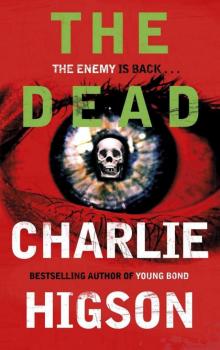 The Dead
The Dead The Sacrifice
The Sacrifice The Fallen
The Fallen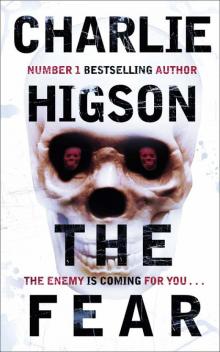 The Fear
The Fear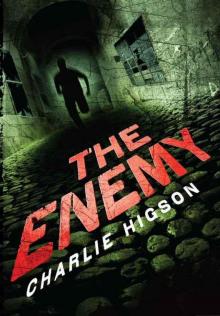 The Enemy
The Enemy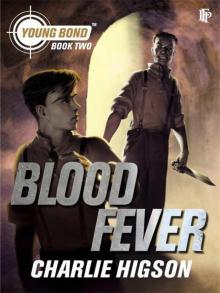 Blood Fever
Blood Fever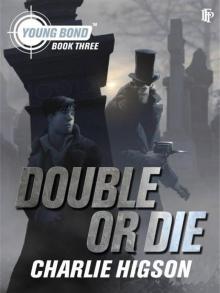 Double or Die
Double or Die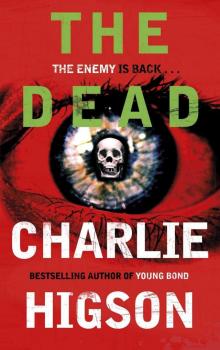 Young Bond, The Dead
Young Bond, The Dead The Hunted
The Hunted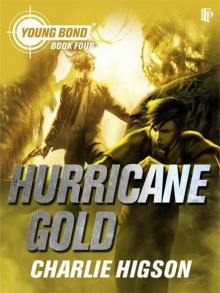 Hurricane Gold
Hurricane Gold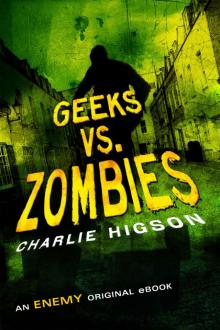 Geeks vs. Zombies
Geeks vs. Zombies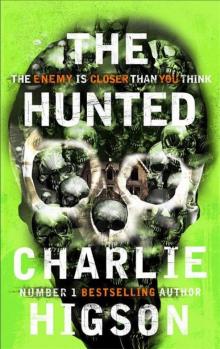 The Hunted (The Enemy Book 6) (Enemy 6)
The Hunted (The Enemy Book 6) (Enemy 6)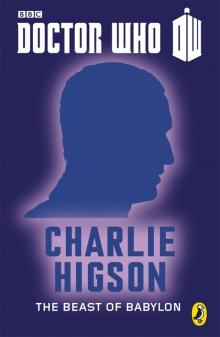 The Beast of Babylon
The Beast of Babylon